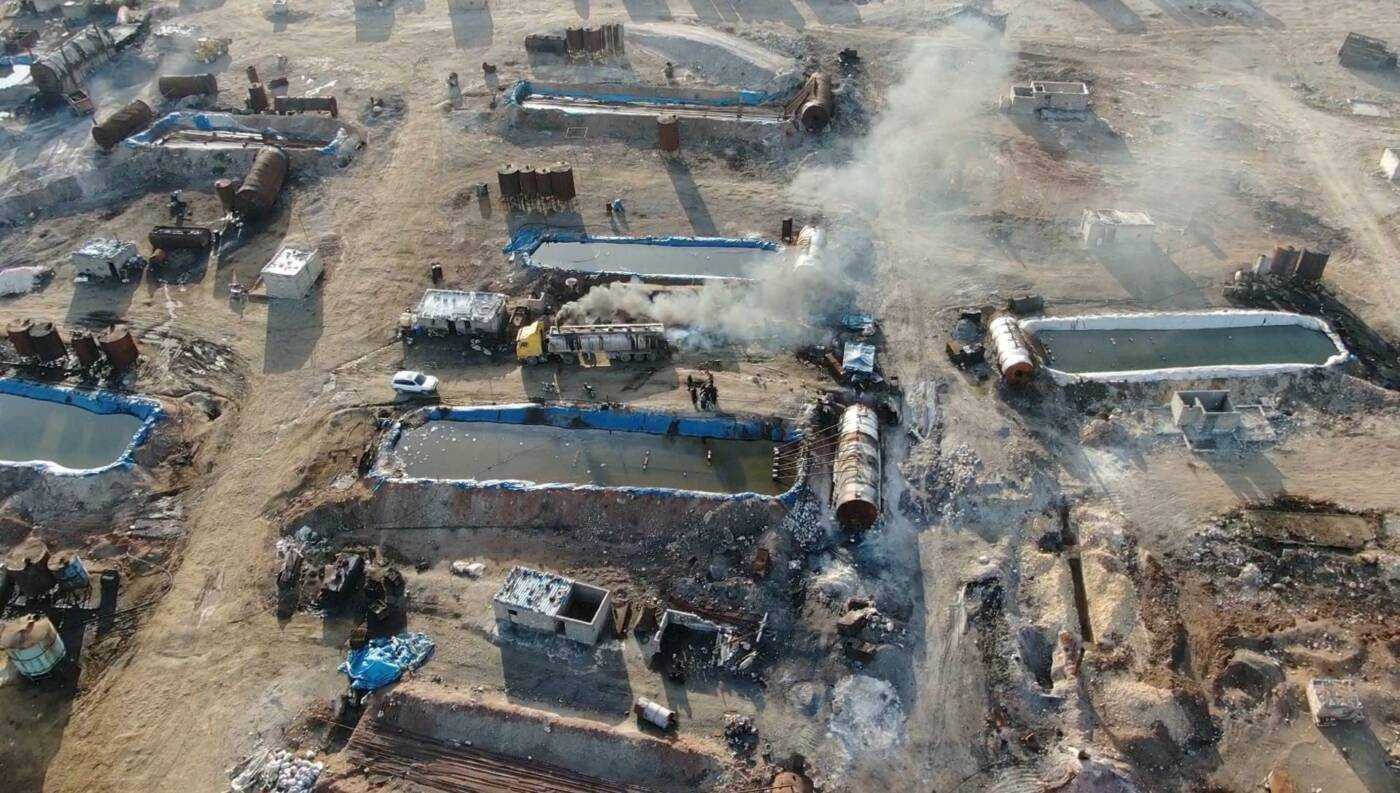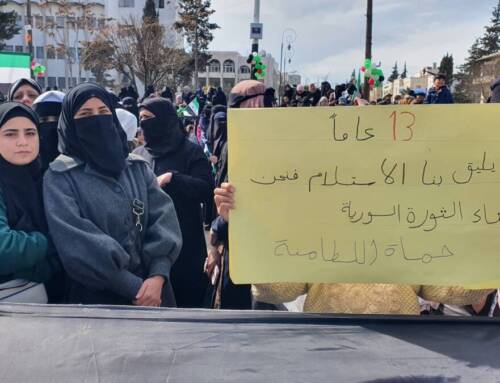How Syria’s makeshift refineries poison people—and the land that sustains them (Photos)
Makeshift oil refineries endanger the health of workers and local communities in northwestern Syria. But their environmental impact, often overlooked, will also affect generations to come.
10 June 2022
PARIS, AL-BAB — “The gas coming from the burners is a disaster,” Ahmad Saeed, a farmer and landowner in northern Aleppo, told Syria Direct. He pointed towards swathes of blackened earth in the distance. “Men die from the smoke of these burners, so how would plants survive?”
Saeed, who lives in the village of Tarhin, is among those most affected by northwestern Syria’s deadly dependency on mazot: locally refined diesel that millions of people use for heating, cooking and transportation.
The makeshift mazot industry is linked to domestic accidents with heaters, fatal explosions at makeshift refineries, and hellish working conditions. It is directly and indirectly responsible for dozens of deaths each year.
[irp posts=”44778″ name=”‘A ticking time bomb’: Hellish work at northwestern Syria’s makeshift oil refineries”]In a grim landscape dominated by the suffering of refinery workers and their families, one aspect is often overlooked: the mazot industry’s devastating environmental impact. The acrid fumes threaten Syrians hundreds of miles away from refining sites, and will haunt generations to come.
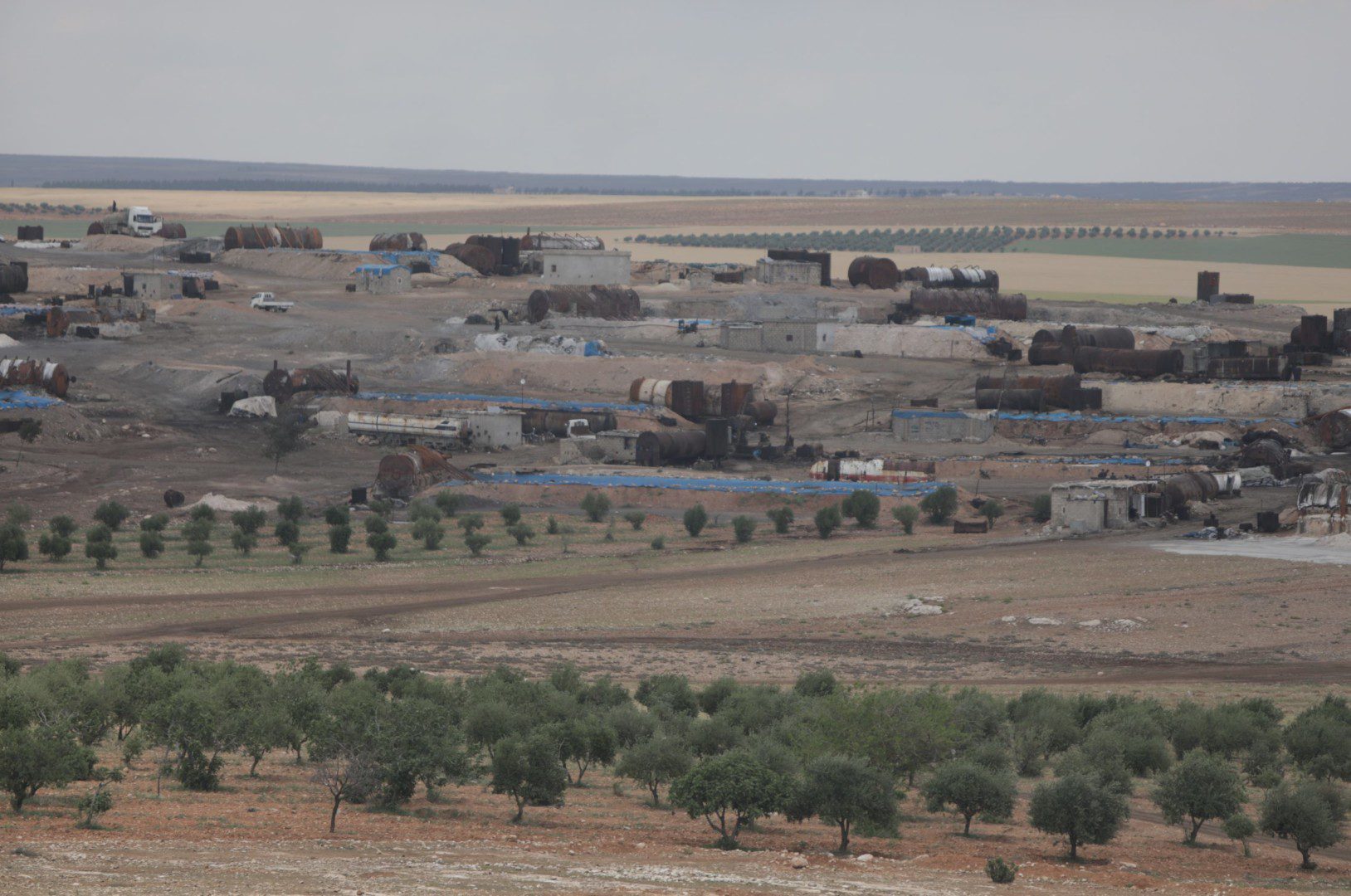
Tarhin village is surrounded by orchards and olive trees, many of which were cut down to clear land for makeshift refineries, 12/05/2022 (Saad Alwan/Violet Organization/Syria Direct)
Limitless pollution
“Nothing can survive near the furnaces, except humans,” Ahmad al-Abdallah, who owns a refinery near the northern Aleppo village of Tarhin, told Syria Direct. “Here, you don’t see a cat walking, a bird in the air. You can’t see at all, actually, with all the smoke.”
The smoke released during the refining process carries a wide range of toxic chemicals into the air. Workers at the burners are directly exposed to carcinogens such as lead, sulfuric acid and polycyclic aromatic hydrocarbons, as well as multiple chemical components known to cause dizziness, eye irritation, and liver and kidney damage.
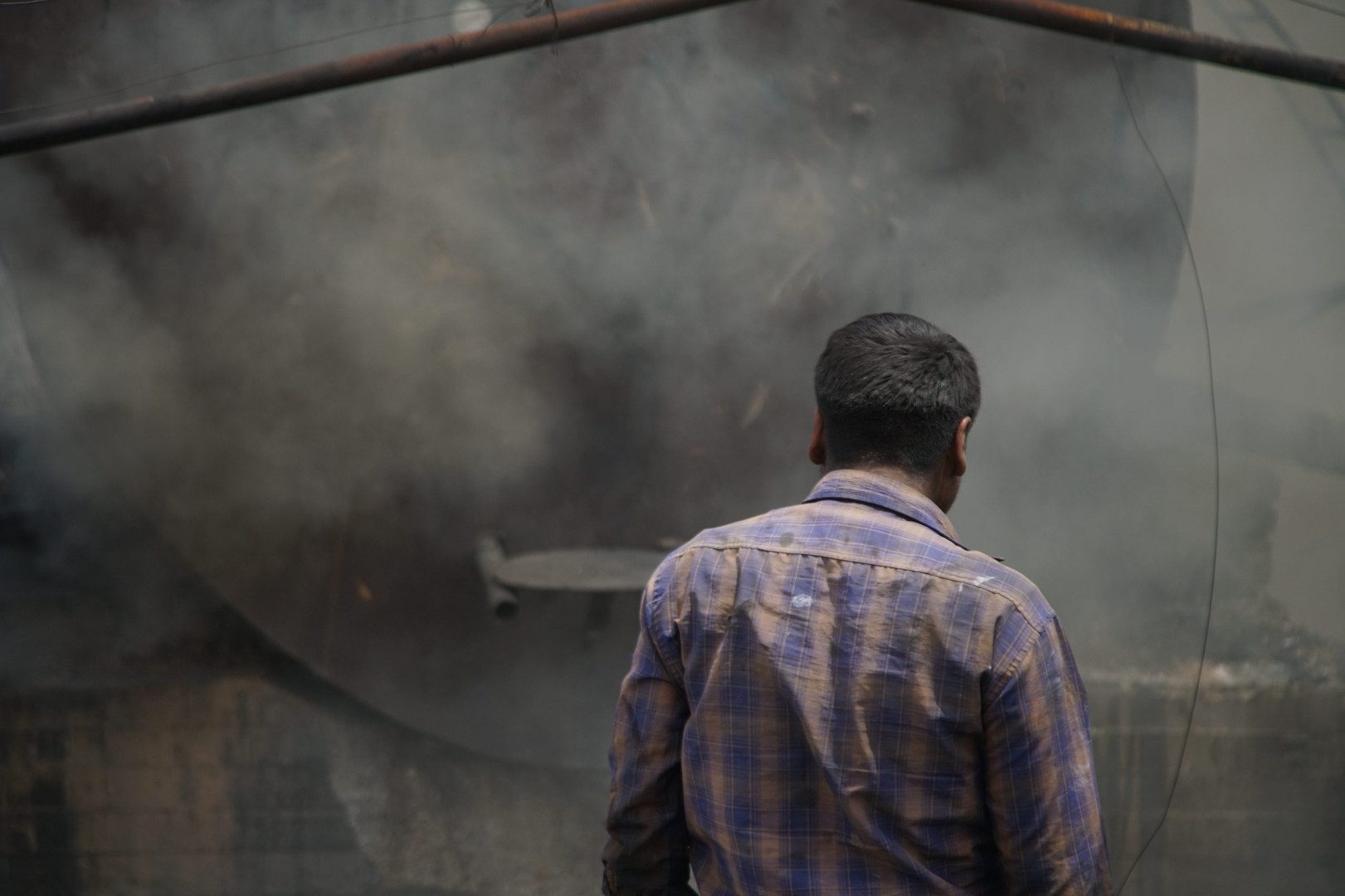
A worker stands in a cloud of toxic smoke generated by a makeshift refining furnace near Tarhin, 12/05/2022 (Saad Alwan/Violet Organization/Syria Direct)
Carried in the air, some of these pollutants affect communities miles away. Nitrogen dioxide and sulphur dioxide can cause asthma, and create and aggravate respiratory problems. Particulate matter is a leading cause of air pollution-related deaths worldwide according to the US Environmental Protection Agency.
[irp posts=”44774″ name=”‘Worse than being on the frontline’: A day at Syria’s makeshift oil refineries (Photos)”]“Air pollution has been a major source of environmental health risks for people working on the refineries and those living downwind,” Wim Zwijnenburg, project leader for the NGO PAX, told Syria Direct. “Long term exposure could lead to respiratory problems, kidney problems from heavy metal pollution and cancers,” added Zwijnenburg, who has authored several articles and reports on the environmental impacts of the Syrian war.
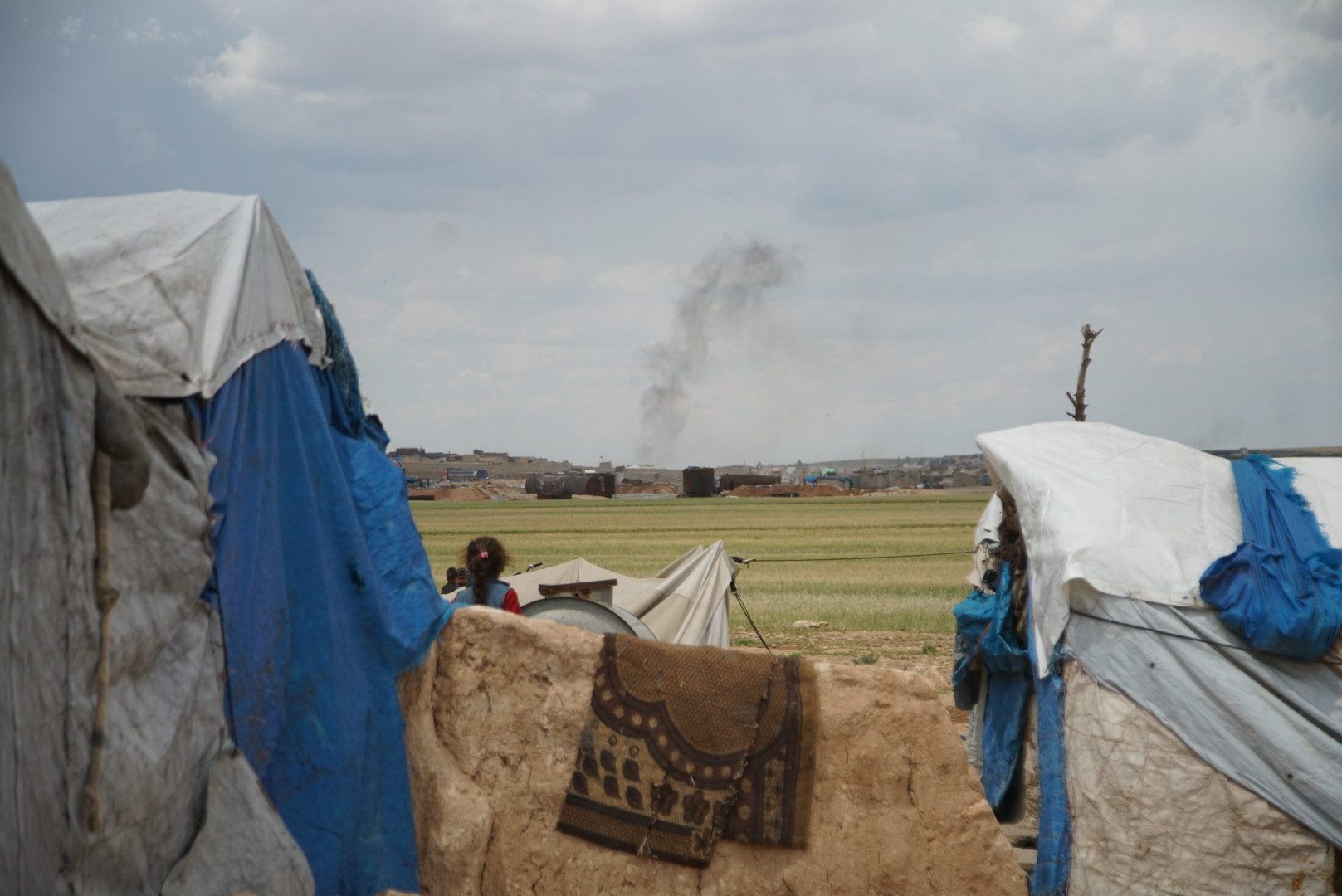
Air pollution also affects nearby residents, including many internally displaced people who live near Tarhin, 12/05/2022 (Saad Alwan/Violet Organization/Syria Direct)
When smoke and dust from the refineries settles on plants and trees, it can hinder natural photosynthesis by blocking out the light received by the leaves. On flowers, it also obstructs pollination, leading crop production to plummet.
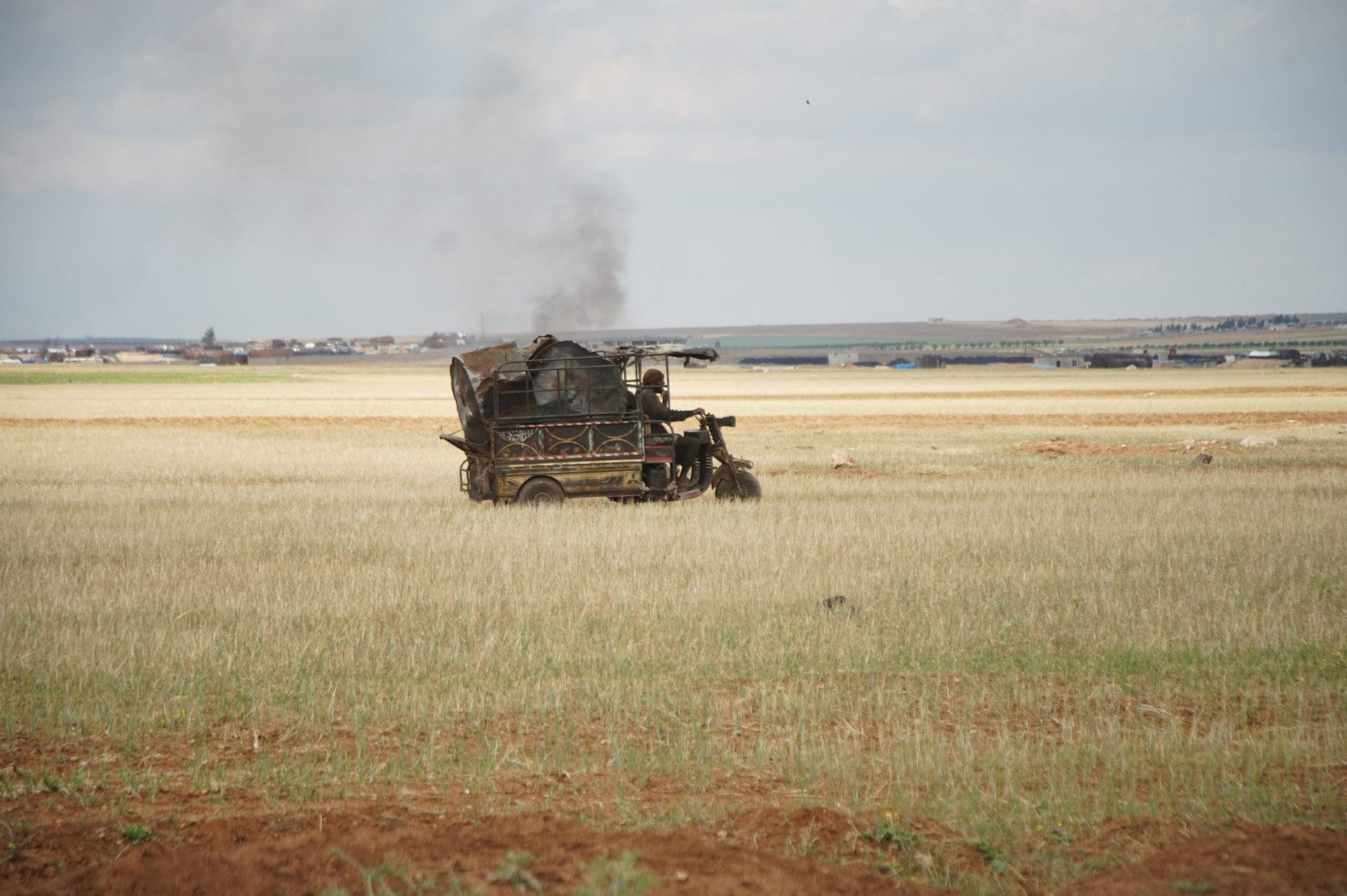
Agricultural areas surround the village of Tarhin and the makeshift refineries, recognizable from a distance by the black smoke they emit, 12/05/2022 (Saad Alwan/ Violet Organization/Syria Direct)
“Before, the situation was good, we had good land yielding good olives,” Saeed said. “But where we used to collect enough to fill 5,000 bags, now we barely fill 200 or 300. Where we used to press 500 cans of olive oil, we now get 70 from 27 hectares and 8,000 trees.”
In one olive grove, covering nine hectares, Saeed had to cut down 90 percent of his trees, which he says died from pollution. He sold them as firewood. The farmer’s cereal yields have also collapsed—from 35 bags of barley harvested each year, down to two.
Black water, dying land
Refinery owner al-Abdallah believes mazot production has a minimal effect on agricultural land. He told Syria Direct that, once the burner is dismantled and the first layer of soil is removed, “the earth returns as it was.” But satellite images of the Tarhin area from the past 11 years seem to show long-lasting changes to the local environment.
Where orchards once grew on the outskirts of Tarhin, black smoke now billows. Satellite images show land dotted with fields and orchards before 2017. After that point, the landscape is dominated by oil burners surrounded by swathes of charred, barren land.
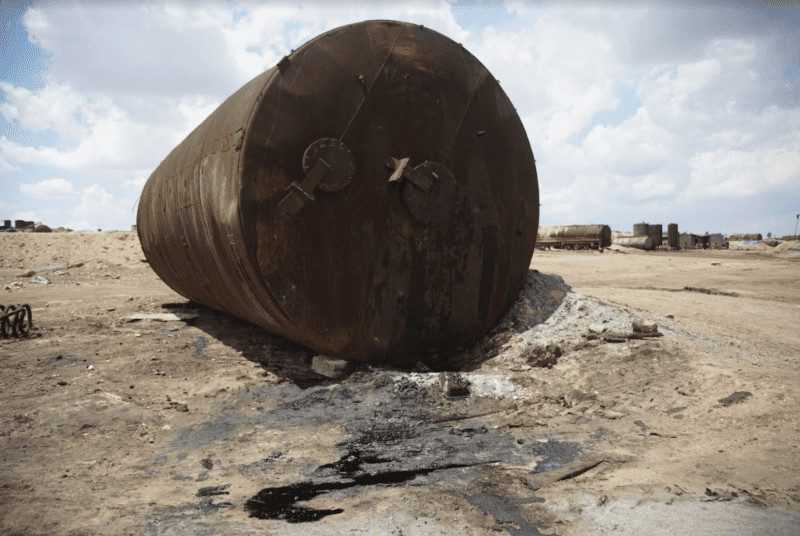
Oil residue can seep deep into the soil, contaminating the land and potentially reaching underground water sources, 12/05/2022 (Saad Alwan/Violet Organization/Syria Direct)
While trees are cut down, the water and land around Tarhin is contaminated by oil spills and the unregulated dumping of waste from the refining process. Oil soaks surfaces all around the burners and seeps into the ground. As it breaks down over time, it releases toxic chemicals in deeper soil—where they will stay for decades—and in underground water channels. It can contaminate water used for drinking, showering and irrigation, making agriculture difficult and crops unsuitable for human consumption.
Possible solutions?
Immediate regulation efforts are needed to manage, as much as possible, oil waste and the cleanup of sites. At the international level, multiple organizations are advocating to include environmental crimes in international law and prosecute parties that intentionally target oil infrastructure. In northwestern Syria, the mazot industry is entirely unregulated, and makeshift refineries have been repeatedly bombed by Russia and the regime.
In the long run, remediation efforts are needed. Lessons learned in Nigeria, which is dealing with decades of oil spills from pipelines in the Niger Delta, and Iraq, can help Syria sketch a path for rehabilitation.
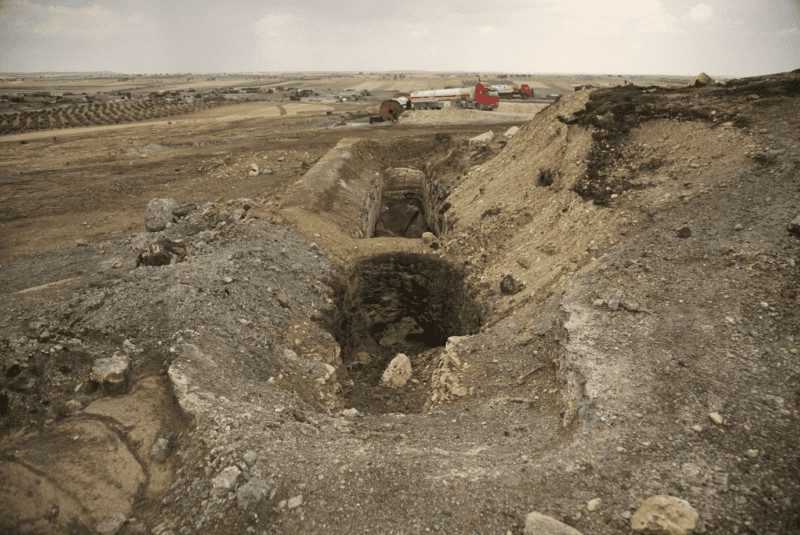
Burnt soil around the remnants of one of the fire pits dug under the furnaces to heat crude oil, 12/05/2022 (Saad Alwan/Violet Organization/Syria Direct)
In Iraq, a UN project tries to use bacteria naturally present in the soil to decontaminate soil poisoned by oil spills. NGOs and international donors could, in time, support similar remediation efforts in Syria. In the short-run, they can try to include environmental considerations in existing projects. One way to do this is to help decrease northwestern Syria’s dependency on the toxic “black gold” by investing in renewable energy solutions and exploring alternative heating sources.
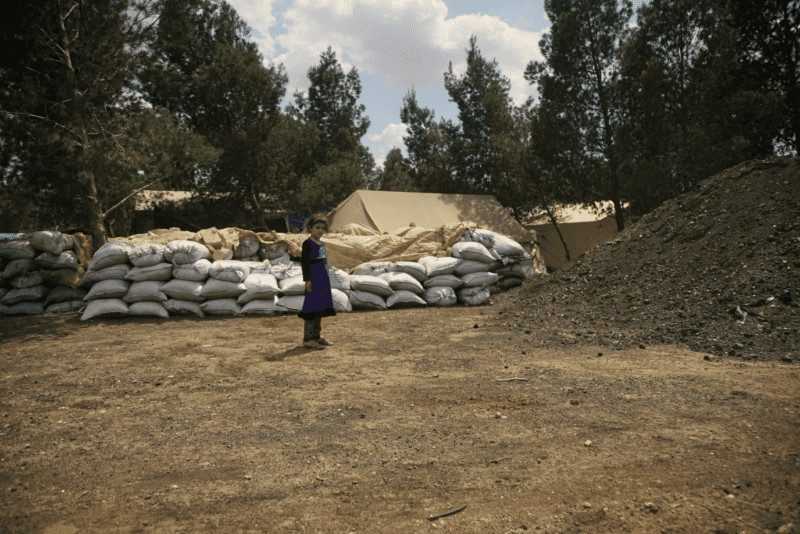
Environmental pollution is set to affect coming generations: here, a child stands in front of bags of coal stored next to her family’s tent near Tarhin, 12/05/2022 (Saad Alwan/Violet Organization/Syria Direct)
But on the ground, affected communities feel powerless. “We tried to form a committee to communicate with military factions that control the area, but nothing has changed,” Saeed lamented. “If the solution was to negotiate with two or even five refinery operators, we would have tried that.” But with more than 100 burners in the area, “who can we negotiate with?”
**
This report was produced with the financial support of the European Union, but does not necessarily reflect the views of the European Union. Its contents are the sole responsibility of Syria Direct and Violet Organization.

